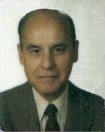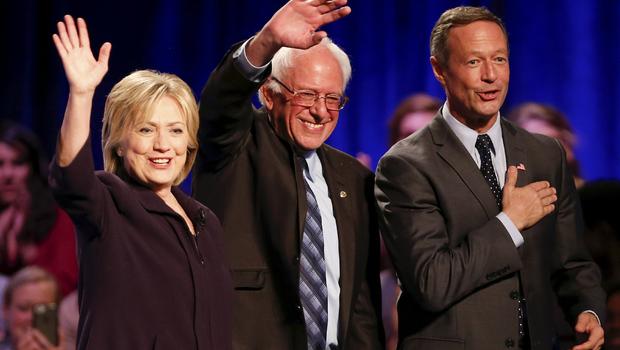www.aljazeerah.info
Opinion Editorials, January 2016
Archives
Mission & Name
Conflict Terminology
Editorials
Gaza Holocaust
Gulf War
Isdood
Islam
News
News Photos
Opinion Editorials
US Foreign Policy (Dr. El-Najjar's Articles)
www.aljazeerah.info
Should Politics, Religion, and Lifework Occupations Matter?
A Commentary on US Democratic Presidential Candidates
By Ben Tanosborn

Al-Jazeerah, CCUN, January 22, 2016
 |
|
| US presidential candidates: Hillary Clinton, Bernie Sandars, and Martin O’Malley, January 2016 |
Should Politics, or Religion, Provide Lifework Occupations?
It’s only fitting that on Martin Luther King, Jr. Day 2016 I’d be writing this column; or that the night before, I would have watched a Democratic debate on television originating in Charleston, South Carolina. For it was in this city’s railway station, eons ago – just before the Civil Rights Act was enacted, that I was boarding a train to return home to the West Coast after being discharged from military active duty at Charleston Air Force Base. Yes; for the first and only time in my life I did get to see “Colored” signs in use, racially segregating the station’s restrooms. Truly a shocking experience then for me after four years in the desegregated military!
And it is here, at the stage of the Gaillard Center in Charleston, where our three political amigos, Hillary Clinton, Martin O’Malley and Bernie Sanders, would be debating the merits of their candidacies to become the Democratic nominee. The Center coincidentally located right across from the historic black church [Emanuel African Methodist Episcopal Church] where seven months before nine black people had been shot and killed during a Bible study session by a young white supremacist.
Sunday evening offered yet another dog and pony show sponsored and produced by the Commission on Presidential Debates (CPD), co-chaired by the two parties that rule American politics. We were shown a stage where three candidate-actors had been cast to perform a farcical political play; one with a sub rosa denouement prefacing the first act, courtesy of the Democratic National Committee (DNC) chaired by Congresswoman Debbie Wasserman Schultz, keeper of the nominating crown and dame-in-waiting for Hillary Rodham Clinton’s anticipated, and yes, inevitable coronation in late July as its presidential nominee at the Democratic National Convention in the city of brotherly, add now sisterly, love: Philadelphia.
Three actors sharing the stage, reading from a lively but subdued script that kept the decorum much in contrast to that of the Republican-legion candidates, where Debbie’s counterpart, Reince Priebus, is likely fearing the prospect of a scary and different coronation: that of Donald Trump, as the GOP’s presidential nominee.
Debbie loves Hillary, but Reince does not appear thrilled with The Donald.
Not surprisingly, and in line with political life in these United States of America, the sum total of time for this trio’s lifework careers was spent solely in politics, or in work related to their entry to the world of politics. Born to lead, they were, we assume, just as the rest of us carry a DNA which hold genetic instructions making us part of the flock to be led.
Hillary Clinton; we all know her path to stardom in politics from the moment she completed her jurisprudence studies at Yale Law School in 1973, not yet 26; which she followed with a stint as Congressional legal counsel until her marriage in 1975 to Bill Clinton and the subsequent quarter of a century “joint” political career with Scoundrel Bill during his governorship in Arkansas and the two terms in the White House. She followed her days as a politically active First Lady, first in Little Rock, then in Washington, with 8 years in the US Senate representing New York; then by 4 years as Secretary of State working for Barack Obama, the man who had earlier (2008) put an end to her ambition to reenter the White House, this time as the leading spouse. Now, in 2016, she is claiming her just deserts once again to be the Democratic Party’s presidential nominee, and possibly become US’ first woman president, our 45th president. At 68 years of age, she has spent over four decades, her entire career, in politics.
Martin O’Malley, not yet 5 when Martin Luther King, Jr. was assassinated in 1968 in Memphis, Tennessee, has also spent his working days since passing the bar in 1988, at 25, in politics; first as State’s Attorney for the City of Baltimore, followed as councilman, then mayor for that city… later becoming Maryland’s governor. At 53 years of age, he has spent his entire – and very successful – career in politics.
As for our colorful, authentic, and crusty Bernie Sanders, his entire working life has been in politics since his Brooklyn-birth 74 years ago. A man with a true quest for social justice, world peace and racial equality, Bernie is probably too authentic and honest, too progressive, in a world of chameleonic politics. A true champion of racial equality who would have earned accolades from the man himself (MLK), he is taken to task by a black leadership who understate his formidable civil rights credentials, far superior to those of all candidates, Democratic or Republican.
So here we are, three presidential candidates, who most people might consider not having done “an honest day’s work” in their lives, vying for the nation’s top executive post… mirroring their Republican counterparts, most of them exhibiting similar public service experience without a “productive” background.
And that brings a legitimate question as to how we address politics, also religion, in selecting, or electing, those people we feel are qualified to lead and influence our lives; all material, social and moral aspects of our lives. Should these leaders come from a specific class or cast, much as we see happening in our everyday lives, where careers in politics (and religion) are chosen at an early age: 20’s, or even earlier; or, would it be preferable to choose our political and moral/spiritual leaders at the late-second or third stage in their lives after proving their mettle in the myriad productive and creative professions? Wouldn’t such requirement add value, credence and trust to those vying for our vote?
I had an uncle; a humble, unsophisticated and formally-uneducated man, who did strongly advocate, and sermonize, the need to establish a minimum age (45-50 according to him) before anyone is allowed to enter politics, “by then,” he said, “80 percent of the lazy bastards and bad apples would be found out and screened out.”
A theory which might be worth putting to the test!
***Share this article with your facebook friends
|
|
|
|
||
|
||||||


